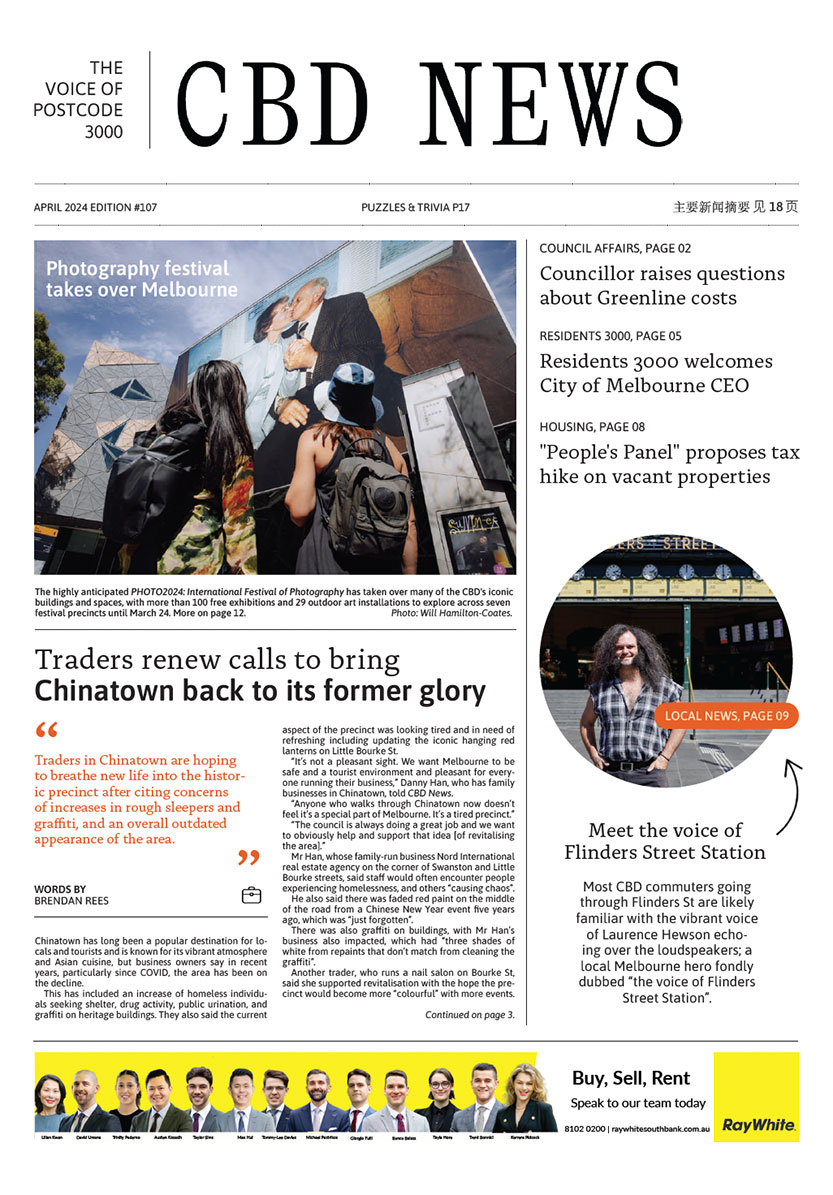Seniors out of the suburbs
By Meg Hill
Bill Clark has Melbourne’s Peregrine falcon livestream playing on the computer in his apartment. After a while, the falcon stands up, revealing the nest at the top of 367 Collins St.
The 74-year-old’s life fits into his small apartment in Elm Tower on Little Lonsdale St, and a look around the room starts to piece it together.
The stickers on his fridge, for example, tell you a few things. An “If you can read this thank a teacher” sticker sits above three different flags – Eureka, Palestinian and Aboriginal.
Or from his bookshelf … “You’ll find my politics there if you start looking,” Bill said.
It’s all observable in one scan of the apartment. That’s partly why Bill wants to change perceptions around apartments and seniors.
“These apartments are the best places for people like me to live. There’s this incorrect idea that seniors belong out in the suburbs in big houses,” he said.
“Firstly, it’s the security and safety, that’s really important for old people. Many of us feel vulnerable.”
Bill said that apartment buildings were the most secure places to live as they weren’t accessible to those that didn’t live in them, while technology added to a resident’s control.
“I can see whoever it is that buzzes my number from nine floors away. And when I get in the elevator, I can only go to the floor that I live on with my security card,” he said.
Owners’ Corporations (OCs) and caretakers are available on call and maintenance is done for free, the space is small and easy to clean, and most apartments are pet friendly. His cat Matty is a favourite on the Elm Tower’s ninth floor.
Bill sold his car because he doesn’t use it anymore. He said all his shopping and health needs are within walking distance, as are most leisure activities. If not, they’re only a short tram ride away.
He moved to the city 11 years ago after eight years “in the bush”. The story takes you back to the stickers on his fridge.
“I was a teacher for 30 years,” Bill said. “Before the Kennett thing happened”.
He had been a principal at two inner-city public primary schools. During Jeff Kennett’s reign as Premier public-school funding was slashed. Hundreds of schools shut down and inner-city schools were some of the worst hit.
“That was the disaster of my career. When that happened, I decided to leave Northcote where I was living and have a complete tree change.”
“So, I went away to the bush and lived in a little hut with my son. We set up an olive grove.”
“It took eight years for the olive grove to get going, to actually have fruit, all we had to do then was prune and pick the olives.”
And after that, he moved to the CBD.
Bill isn’t as politically active as he once was, but he still goes to marches and rallies. His favourites are climate change and refugee rallies.
“The marches are right here; they start at the end of our street.”
His interests are broad – reflected back through his bookshelf where books about dadaism and surrealism, Simone de Beauvoir and Germaine Greer, Oliver Sacks, and Marx converge.
His higher education included both fine arts and Monash University’s first-ever feminist course.
And even so, he said Flinders Lane’s City Library was the best he’d ever come across.
“I’ve been a member of Northcote library and Bendigo library, for example, and they’re good, but this is the best one I’ve ever come across.”
He particularly enjoys the piano on the mezzanine that’s played by members of the public as he selects his books.
Everything that Bill talks about is sewn back into a focus: a senior’s community in the city. He knows the Hoddle Grid well and how it fits with his demographic, and lobbies for the cause: all part of a triumphant return to the inner city post-tree change.

Backloading across borders with Transcorp – navigating interstate moves with ease




 Download the Latest Edition
Download the Latest Edition